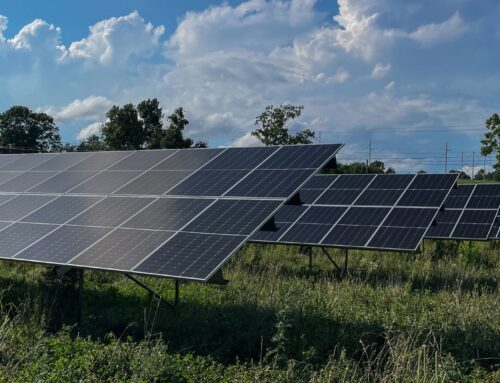Entities can buy and sell these credits with places like the state, other municipalities or energy companies. Pratt told the RoundTable that Evanston uses Midwest Renewable Energy Tracking Systems
The organizations that buy this claim to energy production also get a kickback when the energy is sold. They end up generating revenue as people pay to use the energy.
This kind of market-based incentive for clean energy is also politically easier to make happen than things like government mandates on energy use, according to Cotter. Mandates or ordinances require more time, energy and funding to manage and enforce.
Using credits is also cheaper for the city than installing renewable energy here in Evanston — but price isn’t the only barrier to this kind of installation. The other main problem? Space.
“We couldn’t in Evanston supply 100% renewable electronics with our square footage,” Pratt said. “With current technology, that would not be feasible.”
Investing in renewable energy credits allows the city to support sustainable development and work toward its climate action goals while avoiding the problem of space and price — for now.
Downsides of renewable energy credits The system isn’t perfect, though.
“To some people, RECs feel like cheating, or fake,” Pratt explained. “But it is a market mechanism that has legal standards, so it is recognized as a best practice certification for legal claims to renewables.”
Some people also take issue with the fact that these renewable energy credits can come from far away, and aren’t reducing emissions directly in Evanston.
Outgoing Eighth Ward Councilmember Devon Reid has previously made this argument. At a 2023 council meeting, Reid acknowledged that the purchase of renewable energy credits
The last time Evanston made a serious effort to create more local renewable energy sources was in 2010 offshore wind farm
The proposal eventually fell apart solar panels for the Robert Crown Community Center
“After we procure RECs, we don’t have a lot of choice in where they’re from,” Pratt told the RoundTable. “We just ask MC-Squared to procure them on behalf of a certain period of time, and ask that they’re Midwest RECs.”
That’s the city’s current renewable energy supplier. On Sept. 23, 2024, the City Council approved a six-month extension to its agreement with MC-Squared Energy Services, LLC, a relationship that began in 2021.
MC-Squared is a Chicago-based company founded in 2008 that provides green energy products and community solar to hundreds of thousands of people and more than a hundred municipalities that use governmental aggregation programs, like Evanston.
Another problem with these credits is that eventually, their benefit will run out if more and more entities purchase them.
“If we need everything to be zero emissions, if you just keep burning gas in your peaker plants and then buy RECs, eventually that runs out,” Cotter said. “When everyone needs to be renewable, you run out of ‘somewhere else.’”
If the goal is zero emissions, we can only offload clean energy somewhere else for so long.
In some places, it might be cheaper to build alternative energy sources than to burn fossil fuels. These states then “might build wind energy because it’s cheap, and if they were going to do that anyway, then purchasing their RECs is not additive,” Cotter said.
Community choice aggregation MC-Squared also works with Evanston to provide residents with “community choice aggregation.” Although the city has a contract with the company for both renewable energy credits and community choice aggregation, the two are independent of each other, as Cotter said.
Community choice aggregation theoretically gives residents more power when choosing an energy provider by allowing cities and counties to buy electricity on behalf of residential and small-business utility customers
The idea is to help communities negotiate lower energy prices by pooling all the customers in the same service area together, but savings aren’t guaranteed. In theory, the practice leads to lower prices and more diversity in a community’s sources of electricity.
“It’s basically giving the consumers more power — pun not intended — or more leverage when they’re negotiating their energy contracts,” Cotter said. “Anyone whose account fits the criteria is put in, and then you can opt out. It really isn’t something that I think you notice. I think your power bills are still the same.”
Residents that have not been automatically enrolled but who are interested in the program can also opt in, Pratt said.
The city does use the number of accounts eligible for community choice aggregation to help inform renewable energy credit purchases, though.
“In the past, the city has purchased RECs on behalf of all eligible accounts, not all enrolled accounts,” Pratt said. “Each year, the purchase of RECs varies based on feedback from entities like the Utilities Commission and the Civic Grant amount/budget.”
The changing game Unfortunately, the actual dollar amount of produced energy per renewable energy credit is going down, Pratt said.
This was a topic of conversation at the city’s most recent Utilities Commission meeting on April 17.
“The dollar amount has gone down over time,” Pratt said. “In the past, we did choose how many [RECs] we could buy in order to claim 100% renewable for community choice aggregation. But now, the dollar amount is so low that we probably won’t be able to actually claim that anymore.”
Pratt suggested potentially maximizing the amount of credits the city purchases, and then coming back to tell residents what percentage of energy usage it’s actually offsetting here in Evanston.
“The game has changed a little bit,” Pratt said.
This price change is something the city will have to grapple with, especially as MC-Squared’s contract renewal comes up again this summer.
Related Stories




